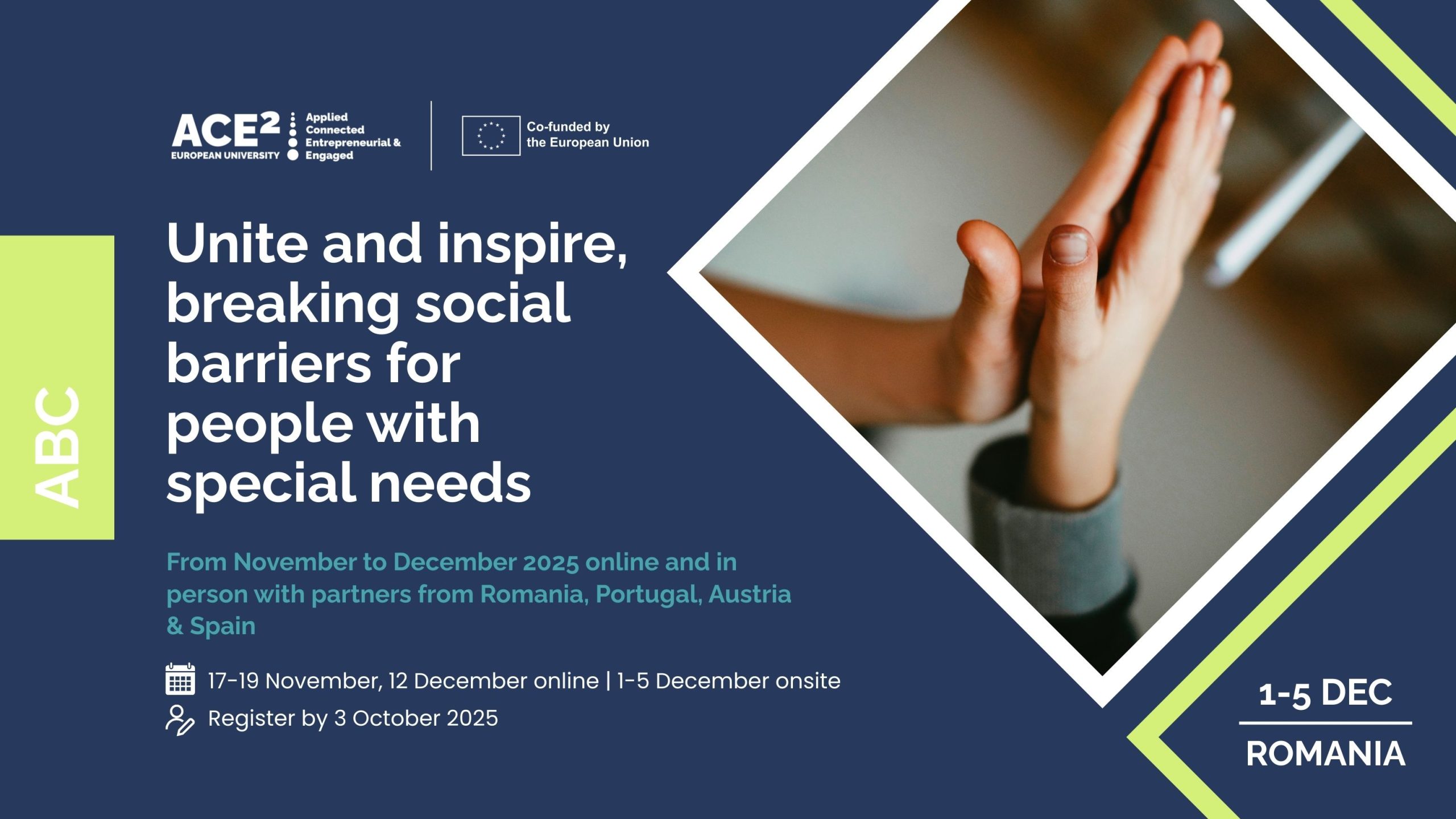

Course Type: Applied Blended Challenge (ABC) Program
These are blended credit-bearing programmes which use a challenge-based pedagogical approach will involve a minimum of one mobility week for participating students and will be open to students from all ACE2 -EU alliance members. The main aim of ABCs is to allow students to work collectively on developing work plans and solutions focussed on solving real-world challenges identified by external stakeholders relevant to EU priority areas, through a blended challenge- based pedagogical approach.
Duration and Timeline:
Award, Credits and Certification
On sucessful completion of the course participants will receive 3 ECTS credits and a certificate of attendance
Organized by:
Constantin Brancusi University(Romania)Lead and Host Institution
Loredana Adriana Pătrăscoiu (UCB)
Rocselana Verdeș (UCB)
Amalia Todoruț (UCB)
Carinthia University of Applied Sciences (Austria)
Oana Ștefania Mitrea (CUAS)
Antonia Kranzelbinder (CUAS)
Santarém Polytechnic University (Portugal)
Perpétua Silva (IPS)
Cristina Novo (IPS)
Isabel Alexandra Damasceno Piscalho (IPS)
Universidad Francisco de Vitoria (Spain)
Susana Bautista (UFV)
Este Vela (UFV)
Laura Martin (UFV)
Lorena Lobato (UFV)
External stakeholders that will be involved in the course:
”Christian” Day Centre
Centres for Inclusive Education – Târgu Jiu
Quality of Life Research Institute
Foundation – Institute of Resources for Education, Social Protection and Restorative Justice
Gorj County General Directorate of Social Assistance and Child Protection
Course Description and Learning Objectives
“It is intended for those who wish to develop the skills, understanding, and attitudes needed to interact effectively and respectfully with people with disabilities, particularly those with neuropsychological conditions, by promoting social inclusion, adapting communication, fostering tolerance, and providing appropriate care. The course focuses on creating inclusive solutions to real challenges in line with the ‘Society for All’ vision and, through a service-learning (SL) and project-based learning approach, engages students in meaningful community initiatives that encourage complex and holistic interventions to support the well-being and participation of people with disabilities.“
Course Description:
This course offers an immersive learning journey that combines interactive online sessions, practical onsite experiences, and reflective follow-up activities, designed to strengthen students’ knowledge and skills in inclusive education and support for people with disabilities.
The program begins with interactive online activities (17–19 November 2025), introducing participants to essential concepts such as sustainable development, human rights, and the principles of creating schools and societies for all. Students will explore key topics including neurodiversity, disability and special educational needs, equity in education, and universal design frameworks (including Universal Design for Learning and Augmentative and Alternative Communication, as aligned with the Convention on the Rights of Persons with Disabilities). The sessions will also address different types of accessibility, assistive and smart assistive technologies, as well as approaches such as Person-Centered Planning and User-Centered Design.
The learning experience continues with the onsite component (01–05 December 2025), blending theoretical modules with applied, hands-on engagement in real-life contexts. Students will gain a deeper understanding of the support systems available for people with disabilities, covering topics such as social support services, the interdisciplinary roles of professionals, and communication techniques adapted to various types of disabilities. Practical activities will include participation in adapted games and social engagement at a Day Centre for people with disabilities, as well as observational and interactive sessions at a Centre for Inclusive Education. These sessions will provide insight into differentiated teaching tools, the comparative benefits and challenges of inclusive versus mainstream education, and the role of families in the educational process. Students will also engage in case study analysis, examining how educational, social, and medical services integrate to ensure comprehensive and continuous care.
The course concludes with online reflection activities (12 December 2025), where participants will consolidate and share their learning. Students will be encouraged to organize workshops at their home institutions, design awareness campaigns, produce educational materials, and collaborate on mini-projects with universities or local organizations. These activities aim to foster sustained engagement, promote inclusive practices, and inspire community-oriented action.
Through this dynamic blend of theory, practice, and reflection, the course equips students with the professional competence and collaborative mindset necessary to prevent exclusion and to effectively respond to the diverse needs of individuals with disabilities.
Specific learning objectives include:
Enhancing students’ capacity to understand the needs of vulnerable people, with a specific focus on individuals with neurological disabilities;
Promoting the development of an inclusive society, Society for All, by educating and empowering future professionals as agents of change;
Promoting a multidisciplinary perspective of intervention, ensuring complex and holistic support .
By the end of the course, students will be able to:
Which students would find this course useful for them?
This course may be suitable for students from ACE2-EU partner universities enrolled in undergraduate or postgraduate programs in the following fields:
Applications Process:
Interested applicants should
🔗 Apply here: https://forms.gle/5DAbu3Gf2gFM31Zq6
Deadline for receipt of applications: 3rd of October 2025, 23:59
A notification of acceptance to participate will be sent to sucessful applicants on the 10th of October 2025 (an acceptance letter will be sent by the host institution and will include program registration details)
Further Information
For any further information or queries related to the course, please contact:
Ace-com@e-ucb.ro.